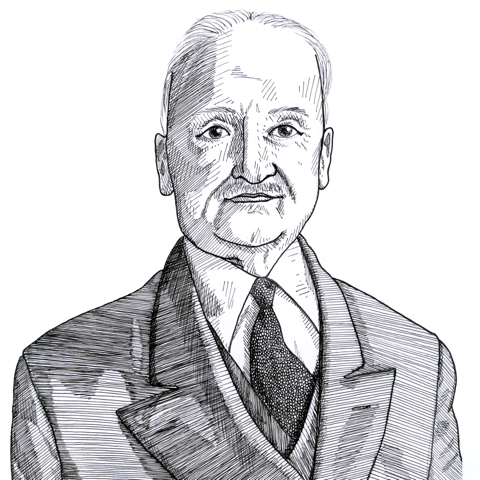
Mises on the gold standard as the symbol of international peace and prosperity (1949)
Found in: Human Action: A Treatise on Economics, vol. 2 (LF ed.)
Ludwig von Mises (1881-1973) noted that the gold standard had both practical and symbolic significance. It was a major means which enabled international trade to flourish and the industrial system to increase dramatically the wealth of all people. Yet, it was correctly identified by economic nationalists as a brake on the expansion of government power, especially by credit expansion and debt, and for that reason had to be dismantled:
Money & Banking
The gold standard was the world standard of the age of capitalism, increasing welfare, liberty, and democracy, both political and economic. In the eyes of the free traders its main eminence was precisely the fact that it was an international standard as required by international trade and the transactions of the international money and capital market. It was the medium of exchange by means of which Western industrialism and Western capital had borne Western civilization into the remotest parts of the earth’s surface, everywhere destroying the fetters of age-old prejudices and superstitions, sowing the seeds of new life and new well-being, freeing minds and souls, and creating riches unheard of before. It accompanied the triumphal unprecedented progress of Western liberalism ready to unite all nations into a community of free nations peacefully cooperating with one another.
It is easy to understand why people viewed the gold standard as the symbol of this greatest and most beneficial of all historical changes. All those intent upon sabotaging the evolution toward welfare, peace, freedom, and democracy loathed the gold standard, and not only on account of its economic significance. In their eyes the gold standard was the labarum [(Latin) derived from the Roman, or Imperial, standard or symbol for which men live or die], the symbol, of all those doctrines and policies they wanted to destroy. In the struggle against the gold standard much more was at stake than commodity prices and foreign exchange rates.
The nationalists are fighting the gold standard because they want to sever their countries from the world market and to establish national autarky as far as possible. Interventionist governments and pressure groups are fighting the gold standard because they consider it the most serious obstacle to their endeavors to manipulate prices and wage rates. But the most fanatical attacks against gold are made by those intent upon credit expansion. With them credit expansion is the panacea for all economic ills. It could lower or even entirely abolish interest rates, raise wages and prices for the benefit of all except the parasitic capitalists and the exploiting employers, free the state from the necessity of balancing its budget—in short, make all decent people prosperous and happy. Only the gold standard, that devilish contrivance of the wicked and stupid “orthodox” economists, prevents mankind from attaining everlasting prosperity.